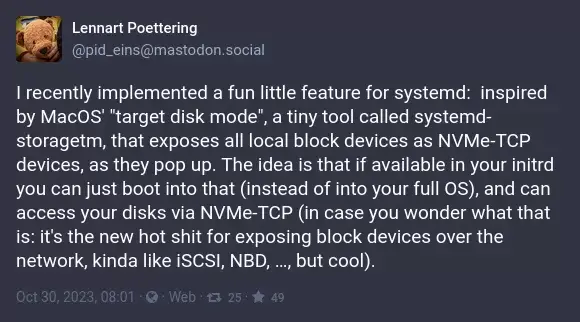this post was submitted on 31 Oct 2023
326 points (95.8% liked)
Linux
48001 readers
953 users here now
From Wikipedia, the free encyclopedia
Linux is a family of open source Unix-like operating systems based on the Linux kernel, an operating system kernel first released on September 17, 1991 by Linus Torvalds. Linux is typically packaged in a Linux distribution (or distro for short).
Distributions include the Linux kernel and supporting system software and libraries, many of which are provided by the GNU Project. Many Linux distributions use the word "Linux" in their name, but the Free Software Foundation uses the name GNU/Linux to emphasize the importance of GNU software, causing some controversy.
Rules
- Posts must be relevant to operating systems running the Linux kernel. GNU/Linux or otherwise.
- No misinformation
- No NSFW content
- No hate speech, bigotry, etc
Related Communities
Community icon by Alpár-Etele Méder, licensed under CC BY 3.0
founded 5 years ago
MODERATORS
you are viewing a single comment's thread
view the rest of the comments
view the rest of the comments

How do you think file systems would be handled? Apple’s SCSI/FireWire/USB/Thunderbolt Target Disk Mode just made all disks available over the interface in a filesystem-agnostic manner. Would I be able to see my ext4 boot partition, ZFS arrays, and any attached volumes?
As with Apple's implementation, filesystems aren't handled - whatever device you connected with would see block devices, essentially no different from a physical disk in your system.